Related Research Articles
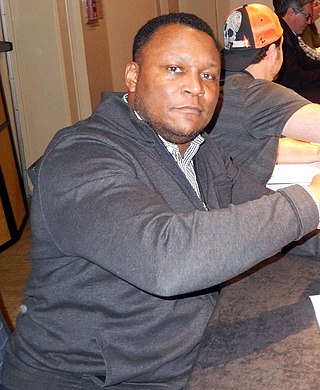
Barry Sanders is an American former football running back who played for the Detroit Lions of the National Football League (NFL) for 10 seasons. Sanders led the league in rushing yards four times and in rushing touchdowns once, establishing himself as one of the most elusive runners in the history of the NFL with his quickness and agility, despite being only 5 ft 8 in tall and weighing 203 lbs. Sanders played college football for the Oklahoma State Cowboys. As a junior in 1988, he compiled what is widely considered the greatest individual season by a running back in college football history, rushing for 2,628 yards and 37 touchdowns in 11 games. He won the Heisman Trophy and was unanimously recognized as an All-American.

Thurman Lee Thomas is an American former football running back who played in the National Football League (NFL) for 13 seasons, primarily with the Buffalo Bills. He played college football for the Oklahoma State Cowboys. Thomas was selected by the Bills in the second round of the 1988 NFL draft, where he spent all but one season of his professional career. He spent his final NFL year as a member of the Miami Dolphins in 2000.
Eric Eugene Crouch is an American former college football player who was a quarterback for the Nebraska Cornhuskers. He won the Heisman Trophy, Walter Camp Award, and Davey O'Brien Award in 2001. Running Nebraska's option offense that year, he completed 105 of 189 passes for 1,510 yards and seven touchdowns, while also rushing for 1,115 yards and 18 touchdowns. He had brief stints playing professionally in the Canadian Football League (CFL) and United Football League (UFL).

Billy Ray Sims is an American former football running back who played in the National Football League (NFL) for five seasons from 1980 to 1984. Sims played college football for the Oklahoma Sooners, where he was a two-time consensus All-American, and won the Heisman Trophy in 1978. He was the first overall pick in the 1980 NFL Draft, selected by the Detroit Lions.
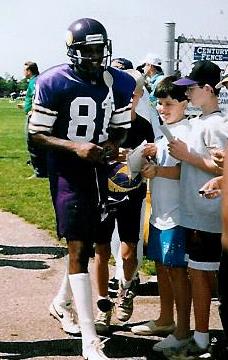
Anthony “AC” Carter is an American former professional football player who was a wide receiver for 13 years in the United States Football League (USFL) and National Football League (NFL). He made three-consecutive Pro Bowls for the Minnesota Vikings and was honored by Minnesota as one of the 50 Greatest Vikings of all time. Carter played college football for the Michigan Wolverines, finishing his career as a three-time All-American, and a two-time unanimous All-American selection. He is currently third all-time in receiving yards, and second all-time in receiving touchdowns for the University of Michigan.

Brian Jeffrey Symons is a former American football quarterback. Symons played professionally for the Houston Texans and the Chicago Bears of the National Football League (NFL), the Frankfurt Galaxy and Berlin Thunder in NFL Europe, and the Tampa Bay Storm of the Arena Football League (AFL). He was originally selected by the Texans in the seventh round of the 2004 NFL Draft. He played college football for Texas Tech where he was a record setting passer. Symons never played in a regular season NFL game.

Larry Jack Mildren, was an All-American quarterback at the University of Oklahoma, and professional football player with the Baltimore Colts and New England Patriots. A native Texan, he was later an oil company owner, elected as the 13th lieutenant governor of Oklahoma, and enjoyed a career as a successful bank executive in Oklahoma.
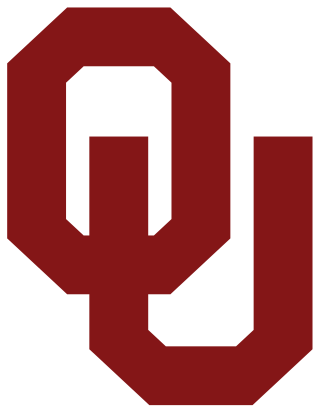
The Oklahoma Sooners football team represents the University of Oklahoma in college football at the NCAA Division I Football Bowl Subdivision level in the Big 12 Conference. The program began in 1895 and is one of the most successful in history, having won 944 games and possessing a .725 winning percentage, both sixth all-time. Oklahoma has appeared in the AP poll 897 times, including 101 No. 1 rankings, both third all-time. The program claims seven national championships, 50 conference championships, 167 first-team All-Americans, and seven Heisman Trophy winners. The school has had 29 former players and coaches inducted into the College Football Hall of Fame and holds the record for the longest winning streak in Division I history with 47 straight victories. Oklahoma is also the only program with which four coaches have won more than 100 games each.

Richard Max Leach is an American former college football player and professional baseball player.

Ian Blake Johnson is an American former football player who was a running back in the National Football League (NFL). He played college football at Boise State.
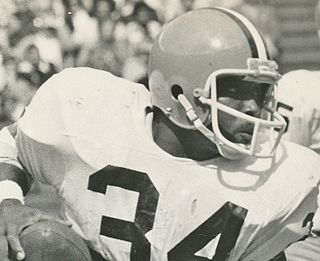
Gregory Donald Pruitt is an American former professional football player who was a running back in the National Football League (NFL) from 1973 through 1984. He played college football for the Oklahoma Sooners. Pruitt was selected to five Pro Bowls, four as a member of the Cleveland Browns and one as a member of the Los Angeles Raiders, the last one as a kick returner. He was also part of the Raiders' Super Bowl XVIII winning team, beating the Washington Redskins.
The Oil Bowl is a high school football all-star game in Wichita Falls, Texas. The game began in 1938, originally between East and West Texas high school football all-stars. In 1945, the game began pitting teams from Oklahoma and Texas, and continued in that format until 2012. In 2013, a dispute concerning the disposition of Oklahoma's share of the game's charitable proceeds led the Oklahoma Coaches Association to withdraw from the game, and the 2013 game matched two Texas teams. For the years in which Texas and Oklahoma teams played, the overall record was 46–19–1 in favor of Texas.

The 1975 Oklahoma Sooners football team represented the University of Oklahoma in the 1975 NCAA Division I football season. The team was helmed by Barry Switzer in his third season as head coach. After sailing through their first eight games, Oklahoma suffered a surprising home loss to Kansas, which snapped a 28-game winning streak. With only two regular season games and a bowl trip left, any hopes for a repeat national championship looked slim.

The 1974 Oklahoma Sooners football team represented the University of Oklahoma in the 1974 NCAA Division I football season. This was the first of three national championship squads for head coach Barry Switzer. Only one opponent played the Sooners within 14 points and four failed to score a touchdown. At the same time, OU led the nation in scoring offense with an average of 43 points per game to finish the season as the only undefeated team in the country at 11–0.

The 1971 Oklahoma Sooners football team represented the University of Oklahoma in the 1971 NCAA University Division football season. Oklahoma was a member of the Big Eight Conference and played its home games in Oklahoma Memorial Stadium where it has played its home games since 1923. The team posted an 11–1 and 6–1 conference record under head coach Chuck Fairbanks. The Sooners finished the season ranked #2, losing only once, 35–31 to eventual national champion Nebraska in the 1971 Nebraska vs. Oklahoma football game, which has become known as Game of the Century.

The 1969 Oklahoma Sooners football team represented the University of Oklahoma in the 1969 NCAA University Division football season. It was the 75th season for the Sooners.
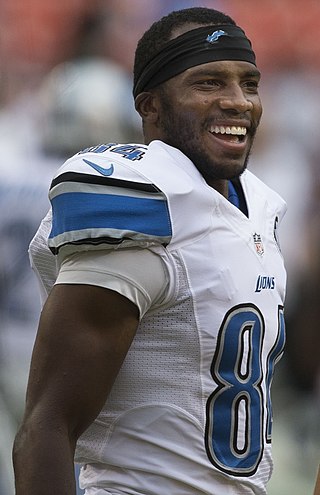
Ryan Broyles is an American former professional football player who was a wide receiver for the Detroit Lions of the National Football League (NFL). He played college football for the Oklahoma Sooners. He set the all-time NCAA Football Bowl Subdivision record for career receptions, and was twice recognized as a consensus All-American. Broyles was selected by Detroit in the second round of the 2012 NFL Draft. He joined the Dallas Renegades of the XFL in 2019, but retired before playing for the team.

The 1978 Oklahoma Sooners football team represented the University of Oklahoma in the college football 1978 NCAA Division I-A season. Oklahoma Sooners football participated in the former Big Eight Conference at that time and played its home games in Oklahoma Memorial Stadium where it has played its home games since 1923. The team posted an 11–1 overall record and a 6–1 conference record to earn a share of the conference title under head coach Barry Switzer. This was Switzer's sixth conference title in six seasons since taking the helm in 1973.

Freddie Lee Barnes is a former American football wide receiver. He was signed by the Chicago Bears of the National Football League (NFL) as an undrafted free agent in 2010. He played college football at Bowling Green.
The 2013 AT&T Cotton Bowl Classic was a post-season American college football bowl game held on January 4, 2013, at Cowboys Stadium in Arlington, Texas in the United States. The 77th edition of the Cotton Bowl Classic began at 7:00 p.m. CST and aired on Fox Sports. It featured the Texas A&M Aggies from the Southeastern Conference (SEC) against the Big 12 Conference co-champion Oklahoma Sooners and was the final game of the 2012 NCAA Division I FBS football season for both teams. Both the Aggies and the Sooners accepted their invitations after finishing the regular season 10–2.
References
- ↑ "2009 Division I Football Records Book: Football Bowl Subdivision (FBS) Records" (PDF). National Collegiate Athletic Association. p. 16. Retrieved 2010-07-09.
- ↑ "2009 Division I Football Records Book: Football Bowl Subdivision (FBS) Records" (PDF). National Collegiate Athletic Association. p. 33. Retrieved 2010-07-09.
- ↑ "2009 Division I Football Records Book: Football Bowl Subdivision (FBS) Records" (PDF). National Collegiate Athletic Association. p. 46. Retrieved 2010-07-09.
- ↑ "Lions sign Steve Owens". Spokesman-Review. Spokane, Washington. Associated Press. June 25, 1970. p. 23.
- ↑ "Lions lose Steve Owens on injury". Spokesman-Review. Spokane, Washington. Associated Press. September 14, 1970. p. 14.
- ↑ "Broncos' tricks trap Lions". Milwaukee Journal. press dispatches. November 29, 1974. p. 14, part 2.
- ↑ "Owens calls it quits with Lions". Victoria Advocate. Texas. Associated Press. August 25, 1976. p. 3B.
- ↑ "Briefs: Football". The Day. New London, Connecticut. March 19, 1998. p. C2.